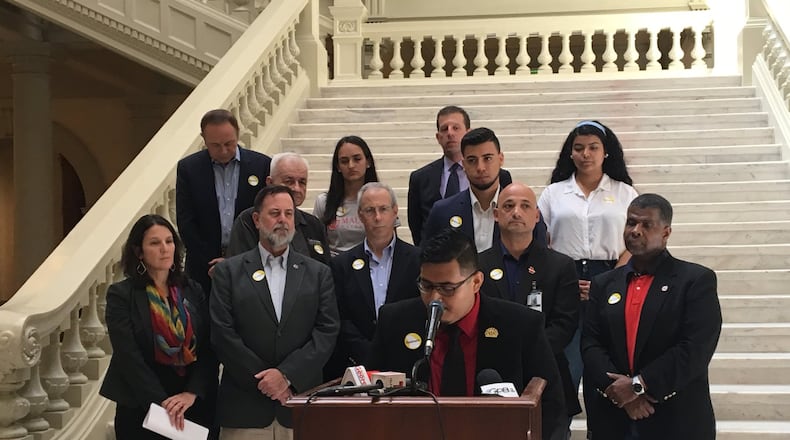Groups representing Latino, Jewish and immigrant communities pushed Friday for Georgia legislators to pass a hate-crimes law in the wake of the past weekend’s shooting in El Paso, Texas, where authorities allege that the suspect targeted Hispanic victims.
Georgia is one of five states in the nation without a law that creates tougher penalties for people who commit crimes against people convicted of attacks based on race, religion, sexual orientation or disability.
Legislation that would have created a hate-crimes law in Georgia, House Bill 426, passed the state House this year but stalled in the Senate, where it never received a hearing or a vote.
Speaking inside the state Capitol, the groups said Georgia’s elected leaders need to take action.
“It is time to protect us and push for bills like House Bill 426 to protect our communities against hate crimes, to warn those who might ever think of hurting us,” said Geovani Serrano, a community organizer for the Georgia Latino Alliance for Human Rights.
Twenty-two people were killed Sunday in the shooting at a Walmart in El Paso, near the border with Mexico. Federal prosecutors are considering hate crimes charges against the suspect.
Several other mass shootings also targeted minorities, including African Americans in Charleston, S.C., Jews at the Tree of Life synagogue in Pittsburgh, Sikhs in Oak Creek, Wis., and Muslims in Christchurch, New Zealand, said Allison Padilla-Goodman, a regional director for the Anti-Defamation League.
“These types of crimes make everyone feel unsafe, and the effects reverberate and can have a long-lasting impact unless they’re addressed head-on,” Padilla-Goodman said. “Ignoring this by not having a hate-crimes law exacerbates the problem.”
Under HB 426, anyone convicted of a crime that’s proven to be motivated by bias would face additional punishment ranging from three months to a year and a fine of up to $5,000 for a misdemeanor offense, or at least two years in prison for a felony.
The next opportunity for the General Assembly to consider a hate-crimes law will be during next year’s legislative session that begins in January.
About the Author
Keep Reading
The Latest
Featured




